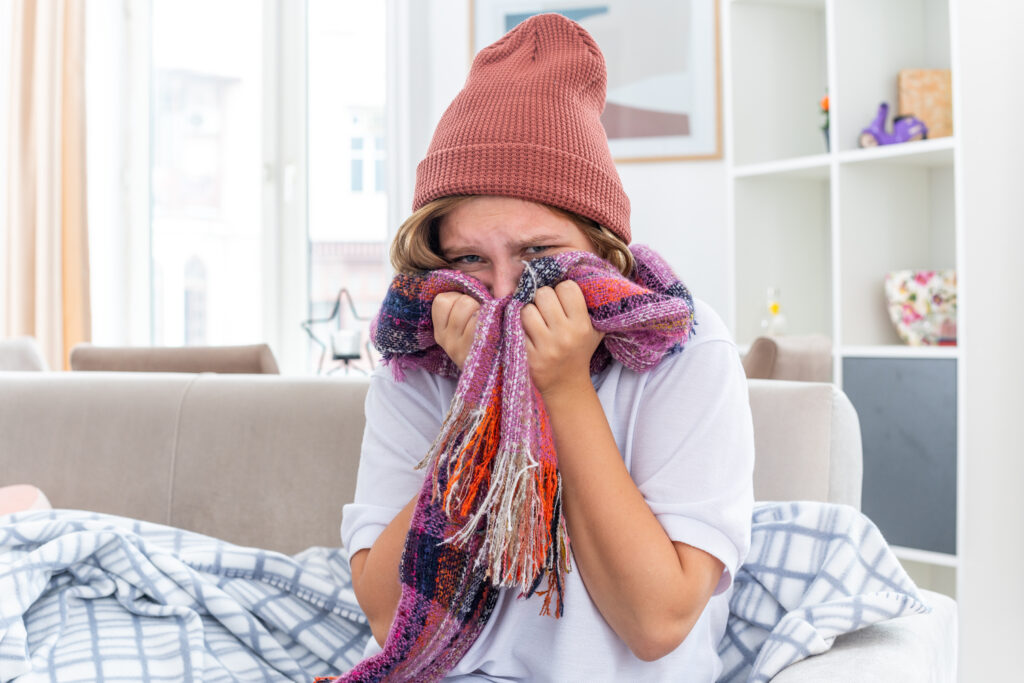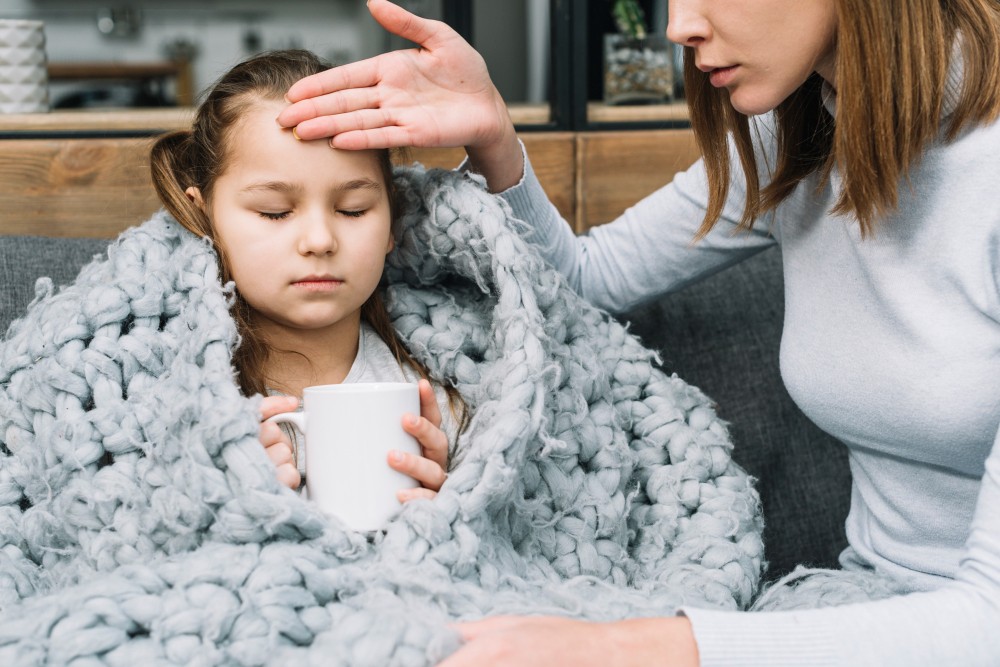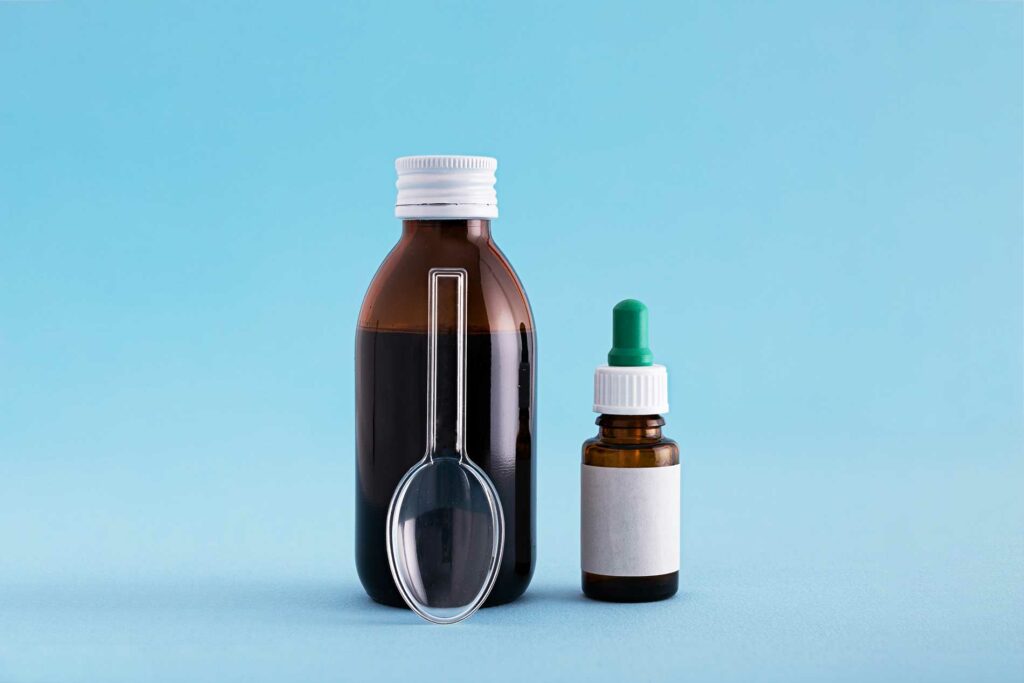Common Cold Treatment in Omaha
What is the Common Cold?
The common cold is an upper respiratory infection that primarily affects the nose and throat. The common cold is responsible for a great number of work and school absences each year, as well as repeat visits to the doctor’s office. It can be caused by a variety of viruses, and often requires little-to-no medical treatment beyond over-the-counter symptom management.

Common Cold Symptoms
The common cold shares basic symptoms with many other upper respiratory infections, including:
- Stuffy and/or runny nose
- Cough
- Scratchy/sore throat
- Sneezing
- Yellow/green nasal discharge
- Mild headache
- Mild body aches
- Low-grade fever
Discerning between the common cold and a more severe infection can be difficult, however, common cold symptoms typically present more mildly than others. Call the friendly staff here at Nebraska Home Pediatrics & Parents to schedule a same-day appointment. Sometimes we can help you with a convenient telehealth visit.
Common Cold vs. COVID-19
Though there are some similarities between COVID-19 and the common cold, there are also some stark determining factors you can look to as you try to decide on a course of treatment. Some symptoms to look for that point toward COVID-19 include:
- Severe, persistent headache
- High fever
- Severe muscle aches
- Excessive tiredness
- Diarrhea, nausea, and vomiting
- Sudden, drastic loss of taste or smell
If you believe that you or your child has come down with COVID-19, don’t hesitate to give us a call. We offer convenient testing services for a variety of illnesses, including COVID-19.
How Long Does the Common Cold Last?
Common cold symptoms usually develop 2-3 days after the virus enters a person’s body. The duration of these symptoms can vary, although the typical length of time it takes a person to recover is between 7-10 days. In the meantime, symptom management via over-the-counter medicines and home remedies is considered to be the best common cold treatment, while you wait to see if the illness dissipates or increases in severity.
When to Seek Medical Attention
With an illness so common, how can you tell for sure that your uncomfortable nose and throat symptoms are simply the common cold? Unfortunately, it’s very difficult to make this official diagnosis from home, which can be frustrating when the illness itself requires little treatment. That being said, there are certain factors that will let you know when it’s time to schedule a doctor visit:
- If symptoms persist in severity after 3-4 days, or new symptoms develop
- A fever above 101.3 degrees Fahrenheit that persists for more than 3 days
- Wheezing and/or shortness of breath
- A fever that returns after being fever-free (without fever reducers) for 24+ hours
- Headache, sinus pain, or sore throat that is persistently severe or intense
These are all signs of more serious illness or a secondary infection. It’s best to be seen by your medical provider here at Nebraska Home Pediatrics & Parents so that you can get quickly tested and on the road to recovery.

How is the Common Cold Spread?
Like many other viruses, the common cold is spread when the virus enters the body via the mouth, nose, or eyes. This can happen in a number of ways:
- Airborne droplets dispersed into the air when a sick person sneezes, coughs, talks, or sings
- Touching your mouth, nose, or eyes after coming into contact with an infected person
- Hand-to-hand contact
- Contaminated surfaces
Can You Prevent the Common Cold?
Unlike many other illnesses, there is currently no vaccine available that prevents the common cold. Following responsible hygiene practices and avoiding certain behaviors can help increase your prevention chances and are relatively simple to do.
- Wash your hands regularly for at least 20 seconds with warm water each time.
- Use hand sanitizer that is 60% alcohol or more when hand washing isn’t possible.
- Cover your cough by coughing into tissues or the crook of your elbow, and always make sure to wash your hands or use hand sanitizer as soon after as you can.
- Do your best to take care of your body; get enough sleep, take vitamins, stay hydrated, and exercise.
- Avoid large crowds if you can.
- Disinfect surfaces in your home, especially when a family member is sick or illness numbers are high at work or school.
Home Remedies and Self Care
It’s important to remember that antibiotics are not an effective form of common cold treatment. Antibiotics are effective against bacterial infections, and have no effect on viral infections like the common cold.
So, if there is neither a cure nor a vaccine for the common cold, what can you do?
Your best course of action is to treat your symptoms as you wait for the cold to get better and eventually go away. Some effective common cold treatment methods include:
- Staying hydrated
- Getting plenty of rest
- Cool mist humidifier
- Saline nasal rinses
- Pain relievers and fever reducers like ibuprofen and acetaminophen
- Honey for ages 1 year and older
- Drinking warm liquids
- Throat lozenges
- ALWAYS CHECK THE LABEL TO MAKE SURE THE MEDICATION IS APPROPRIATE FOR THE AGE

Schedule an appointment for common cold symptoms
At Nebraska Home Pediatrics & Parents, we know how frustrating and miserable the common cold can be. If you’ve read through the symptoms on this page and are still worried that you or someone in your family needs to be seen by a medical provider, please call us today and schedule an appointment.